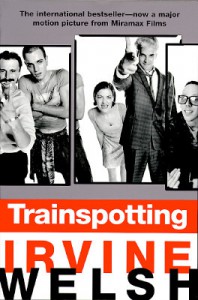Trainspotting

'Trainspotting' starts off more like a collection of short stories sharing the same characters than one cohesive story - this being about a group of working class Scottish junkies and their world. But, in the end, I think its clear who the story is revolving around.
The book largely reminded me of Sarah Orne Jewett's 'The Country of the Pointed Firs'. On the surface they have absolutely nothing in common, but I kept making links between the two.
Jewett's book, written in the late 19th century, is about a young woman writer spending the summer in a small coastal Maine town in economic decline. There is never a change in narrator but each chapter is episodic and could largely stand on its own.
Welsh explores the desperation of economic decline (among other things) and allows his characters to express their anger, lack of hope, and act in ways only those who feel they've lost all options can act. There is a greater story arc surrounding Renton, but the novel could easily be sold as a story collection.
The most significant connection though was the use of language. Or I should say their legitimization of dialect. Jewett's narrator is an educated woman who speaks and writes in standard English, but the rest of the characters are Mainers of the old school. Their dialect is more subtle than Welsh's Scots, but having a host of Great Aunts and Uncles in Maine I recognized the language immediately.
The voices in 'Trainspotting' were vividly clear. Jewett's book is an achievement on much lesser scale, but her book and characters are also limited a great deal by their times (though I have a feeling her Mrs.Todd would heartily agree with Alison and Kelly's feminism). Welsh is harsh, funny, sobering, and surprising.
The further I got into it, my early complaints about the scattered nature of the book disappeared. Every aside Welsh introduces informs the rest of the book. I ended up being unable to put the book down for its last half. It ends on such a perfect note I don't think I want to see how Welsh continued it with 'Porno'. It's rare that an author can revisit such fully described and placed characters without taking something away.













